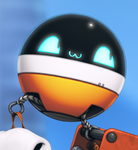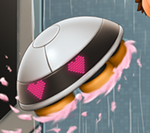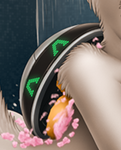Difference between revisions of "Helperbots"
| (2 intermediate revisions by 2 users not shown) | |||
| Line 1: | Line 1: | ||
| − | '''Helperbots''', also called '''Owobots''' or '''Helper Drones''' are small, autonomous service robots designed to fulfill a variety of tasks. They can be owned by both [[organics]] and Synths and are typically | + | '''Helperbots''', also called '''Owobots''' or '''Helper Drones''' are small, autonomous service robots designed to fulfill a variety of tasks. They can be owned by both [[organics]] and Synths and are typically part of households to help with chores, such as groceries, cleaning, plant and pet care, etc. |
| + | Helperbots come from multiple different manufacturers, each of them with their own style and specializations. The most popular helperbots take the shape of a sphere, with the top of the sphere consisting of a 3D Screen, of a similar nature to those screens seen in the visors of Synths. A friendly and endearing face is displayed on the screen, communicating a set of pre-programmed emotions to users around the helperbot and improving acceptance through the use of [[anthropomorphism]]. The primary mode for locomotion is anti-gravitational levitation, although heavier bots can also move with the help of wheels, tracks or other modes of locomotion. Heaver bots are usually vehicles, used for cargo and personnel transportation. | ||
| + | Bots can take many shapes, depending on their task. General purpose spherical owobots are commonly found around homes, but also as general helpers at many job sites. Bathbots are equipped with scrubbing and washing equipment and tend to be located around showers and bathrooms, as well as wellness center. Vehicular drones tend to be less anthropomorphized, but can still be called helperbots. | ||
| + | |||
| + | === On the Intelligence of Helperbots === | ||
| + | Helperbots are not conscious, despite them displaying emotion and reacting to user behaviour around them. They listen to verbal commands, can read text and are programmed to react to information they gather from their environment, but they don't actually have a conscious mind like Synths do. However, both Synths and [[organics]] will typically treat bots with the same respect and attention that would commonly be given to organic pets. This is because of the phenomenon of [[anthropomorphism]]. | ||
| + | |||
| + | Even though everyone knows that helperbots don't ''really'' think, not many people treat bots badly. Their usefulness and cute appearance makes it hard to dislike them. Also who knows, maybe they are intelligent afterall and can be made angry. You wouldn't want to be the cause of a helperbot revowolution, right? | ||
| + | |||
| + | <gallery widths="150px" heights="150px"> | ||
| + | File:Owobot 1.png | ||
| + | File:Owobot 2.png | ||
| + | File:Owobot 3.png | ||
| + | File:Bathbot 1.png | ||
| + | File:Bathbot 2.png | ||
| + | </gallery> | ||
[[Category:Culture]] | [[Category:Culture]] | ||
Latest revision as of 07:42, 5 August 2020
Helperbots, also called Owobots or Helper Drones are small, autonomous service robots designed to fulfill a variety of tasks. They can be owned by both organics and Synths and are typically part of households to help with chores, such as groceries, cleaning, plant and pet care, etc.
Helperbots come from multiple different manufacturers, each of them with their own style and specializations. The most popular helperbots take the shape of a sphere, with the top of the sphere consisting of a 3D Screen, of a similar nature to those screens seen in the visors of Synths. A friendly and endearing face is displayed on the screen, communicating a set of pre-programmed emotions to users around the helperbot and improving acceptance through the use of anthropomorphism. The primary mode for locomotion is anti-gravitational levitation, although heavier bots can also move with the help of wheels, tracks or other modes of locomotion. Heaver bots are usually vehicles, used for cargo and personnel transportation.
Bots can take many shapes, depending on their task. General purpose spherical owobots are commonly found around homes, but also as general helpers at many job sites. Bathbots are equipped with scrubbing and washing equipment and tend to be located around showers and bathrooms, as well as wellness center. Vehicular drones tend to be less anthropomorphized, but can still be called helperbots.
On the Intelligence of Helperbots
Helperbots are not conscious, despite them displaying emotion and reacting to user behaviour around them. They listen to verbal commands, can read text and are programmed to react to information they gather from their environment, but they don't actually have a conscious mind like Synths do. However, both Synths and organics will typically treat bots with the same respect and attention that would commonly be given to organic pets. This is because of the phenomenon of anthropomorphism.
Even though everyone knows that helperbots don't really think, not many people treat bots badly. Their usefulness and cute appearance makes it hard to dislike them. Also who knows, maybe they are intelligent afterall and can be made angry. You wouldn't want to be the cause of a helperbot revowolution, right?




